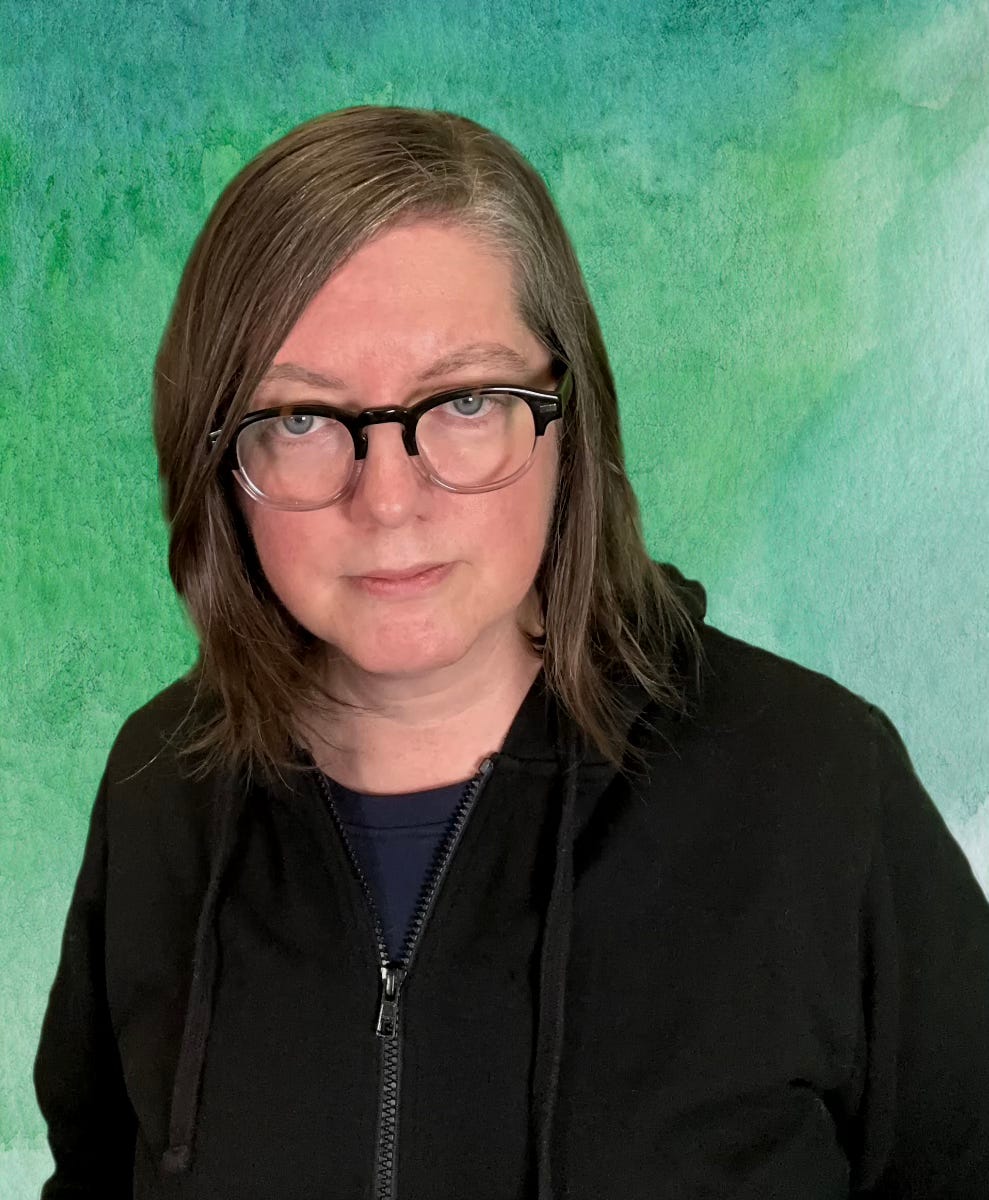The Auti Peri Q&A: Jen deHaan
"I just worked to accommodate and help myself - I mean, many of us autistics can be pretty used to that."
Hi, I’m Sam (she/her). A late diagnosed neurodivergent woman, a tenacious midlife struggler, and an advocate for people in autistic perimenopause here at The Autistic Perimenopause: A Temporary Regression AKA The Auti Peri.
I am delighted to be the host of The Auti Peri Q&A Series!
In this series, I host a Q&A interview with a fellow autistic person about their experience of the menopause transition.
Everyone’s experience of the autistic menopausal transition is different. I aim to elevate the voices, lived experiences and reflections of autistic people’s menopausal transition.
Autistic perimenopause is a highly individual, dynamic and sometimes prolonged life stage caused by reproductive hormonal fluctuations. As autistics can be highly sensitive to bodily and environemntal, we may experience fluctuations as physical, psychological and cognitive symptoms.
Academic research into auti peri is in it’s early stages, yet it is a matter or urgency that we bust the social taboo and get used to talking about this.
Today’s guest is Jen deHaan, creator of Neurodivergent Minds in Comedy/Neurodiversity in Improv: “I write about creativity, acting, improv, and neurodivergence. I do not post on Notes - articles via email subscription (you can sub here if you want!), newsletter.improvupdate.com, & Bluesky only. Hope to see you there!”
Jen de Haan (she/her) lives in Vancouver Island in B.C., Canada. Jen has recorded an audio for her responses which is definitely worth a listen as she is a fantastic improv comedian!
Jen deHaan has taught and coached improv at several schools including World’s Greatest Improv School (WGIS) and Queen City Comedy. She was also the Online School Director of WGIS. Jen does improv shows and makes podcasts for small niche audiences such as the one on this site, and a bunch of podcasts and shows delivered on StereoForest.
Jen founded StereoForest so she can create, direct, and produce podcasts, web series, animated series for both audio and video delivery.
Bluesky socials:
What does “autistic perimenopause” mean to you?
For me the term acknowledges co-morbidities exist. Both autism and perimenopause co-exist and can interact. They might be next door neighbours and make life more difficult, or they layer on top of each other and make that weighted blanket on your shoulders even heavier.
Autistic perimenopause validates that menopause is a unique experience for autistic humans.
When did your autistic perimenopause symptoms start and what were/are they?
I was very fortunate to have few symptoms over those years, so what I experienced wasn’t easily identified as perimenopause. I also had a hysterectomy in my mid-30s for medical reasons and that also makes the timing of everything hard to assess.
But I - most likely - had symptoms in my early to mid 40s. Mine were unusually dramatic and sudden mood shifts that would last several days to a week or two. They were intense and difficult to manage and the on-and-off episodes lasted several years.
I haven't had them for a couple years now, and thanks to a very recent FSH test I learnt I'm most likely in full menopause now (apparently these tests aren't all that definitive, but likely). Side note - not covered by our health care in my region of Canada. Anyway - I reckon those mood issues were part of the autistic perimenopause experience since I didn't make any changes when they went away.
Regardless, not a fun ride! But I am quite lucky I didn't have other symptoms on that side of things - that I know of anyway.
Now I will add that I have some current symptoms that might be due to my lymphatic system in its new post-menopause state. So the ride, here to say it continues!
What happened if/when you presented with autistic perimenopause to a healthcare professional?
I brought up the mood swings with a few health care providers, wondering if they were related to menopause, and that was met with indifference. So I just worked to accommodate and help myself - I mean, many of us autistics can be pretty used to that, I suppose.
This is somewhat commonplace where I live though, it’s hard to access any help especially with these two things. Anything preventative. Anything mental health.
What has your treatment protocol been in managing your autistic perimenopause (medical, lifestyle, alternative therapies etc.)?
Prior to the ongoing pandemic I managed mood mostly through diet and exercise. And the biggest difference was exercise - it truly helped balance me or at least make it manageable on the mental health side.
Since 2020 I haven’t had access to the type of exercise that made the biggest difference to me, or safe health care access, so mostly managed everything by gritting my teeth on my own.
The exercise in my "new life" wasn't as beneficial as when I was a dance fitness instructor (my love and passion!), but it still helped. Music helps a lot, especially the right "stim song" song on loop. A lot of teeth gritting though, especially when a more intensive depressive episode also kicked in towards the end of the peri.
How has your everyday life been impacted by autistic perimenopause (your caring/employment responsibilities, hobbies, relationships etc.)?
The severe mood swing episodes really affected executive dysfunction. Or rather, amplified what was already in place. Just made what was there much, much harder. I had to rely on the people who live with me more, and that can be fairly hard.
Are there things that make or have made your menopause transition especially difficult for you as an autistic person? If so, what kinds of things?
You have what’s impacted already by autism, and then you layer the peri on top. Feeling burdensome is something many of us autistics experience, so I think that made it harder. The shame. It's not logical, or "right", but it's there and I had to deal with it.
Are there things that could make or could have made your menopause transition easier for you as an autistic person? If so, what kinds of things?
I'd love to say "a support group" but I have a lot of difficulty participating in them, and though have tried a lot of therapy haven't really found something that has helped much.
I wish I found some of the supplements that have helped me in recent years earlier (like agmatine sulfate and l-thianine amino acids - but the right combo differs for everyone... genetics!). Finding these (possible) deficiencies or needs came from my own investigation and are very low risk. Thankfully I could just try things out. Being matched with a good naturopathic doctor who is really aware of what we can try would have perhaps helped me find them earlier. And who knows what I have yet to find.
These are some of the only things that have actually made a big difference in this space of mental wellness.
What supports, resources and services are available to people experiencing autistic perimenopause where you live?
None. But we have a largely collapsed health care system where I live, and little to no support for mental health challenges. I’ve searched quite extensively. Assistance is mostly private-pay therapy, coaching, naturopathic assessments, or support groups. I just got a doctor again after many years of not having one at all.
What kinds of services, resources or supports would you find most helpful?
I learnt several years too late that it is good to have FSH testing post-hysterectomy if you are younger than 40, because you might want the option for hormone therapies if you go into early menopause. Despite seeing many doctors and surgeons who were aware of my status, noone told me that! I don't know much about this though (when I ran across that note it was too late and I didn't investigate further). But, might be helpful and something to inquire about with a doctor if this applies to you.
Genetic testing (for things like MTHFR, COMT, etc) to make sure you are eating and supplementing in ways that might help your mental and physical health. Can make a surprising difference with small adjustments.
Safe health care access, period.
Greater variety in, and access to, therapy and support groups. While they haven't worked well (or at all) for my autistic brain, I'd be really open to trying new and unique approaches.
What is the easiest way for you to access information about autistic menopause?
Online/virtual programs and resources.
What would you wish for all people to know about autistic perimenopause?
Overlap of traits and symptoms can be dramatically difficult. It’s like putting hard mode on genius mode or whatever. And few to any people understand this is even “a thing.” So many don't understand adult or gendered autism concerns. Heck, I barely understand what went on with me and menopause because of the hysterectomy.
So... for people to know it's hard to experience, hard to figure out, and very hard to access understanding, helpful assistance of any kind.
Is there anything else you’d like to share regarding your autistic experiences of menopause?
I don't really have anything else to share that isn't covered above :)
I hope you enjoyed this Q&A. If you would like to be featured as part of this series, please message me. I’d love to share your story!







